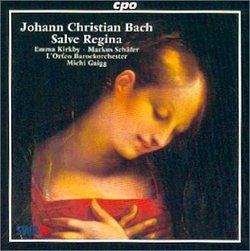| All Artists: Johann Christian Bach, Michi Gaigg, Emma Kirkby, Markus Schäfer, L'Orfeo Barockorchester Title: J. Ch. Bach - Sacred Works - Salve Regina · Laudate pueri / Kirkby · M. Schäfer · L'Orfeo BO · Gaigg Members Wishing: 0 Total Copies: 0 Label: Cpo Records Release Date: 5/15/2001 Genres: Pop, Classical Styles: Vocal Pop, Opera & Classical Vocal, Historical Periods, Classical (c.1770-1830) Number of Discs: 1 SwapaCD Credits: 1 UPC: 761203971824 |
Search - Johann Christian Bach, Michi Gaigg, Emma Kirkby :: J. Ch. Bach - Sacred Works - Salve Regina · Laudate pueri / Kirkby · M. Schäfer · L'Orfeo BO · Gaigg
 | Johann Christian Bach, Michi Gaigg, Emma Kirkby J. Ch. Bach - Sacred Works - Salve Regina · Laudate pueri / Kirkby · M. Schäfer · L'Orfeo BO · Gaigg Genres: Pop, Classical
|
Larger Image |
CD Details |
CD ReviewsJ.C. Bach - The Catholic Bach 02/01/2003 (5 out of 5 stars) "J. S. Bach, the staunch Lutheran composer of the Baroque period, produced a son who would become one of the great Catholic composers of the new Classical period. He was the youngest of J. S. Bach's sons, and a convert to the Roman Catholic Faith. Although the conversion of Johann Christian Bach brought sorrow to his family, it gave a new dimension to his amazing music. It also gave the Church a gifted composer for the Liturgy. His music was written in Latin for the Church, and this recording is the best example I've ever heard. The recording of the Salve Regina, a prayer to the Blessed Virgin, is particularly fine. The psalm and motet on the recording are wonderul! I highly recommend this CD for all true lovers of the Classical period, and of J. C. Bach in particular. The instruments and singing are a perfect! If you want one CD that shows the talent of this composer -- this is the one!" The Italian Bach Meets the English Queen... Giordano Bruno | Wherever I am, I am. | 09/01/2009 (5 out of 5 stars) "... or as an alternate title, The Catholic Bach Salutes the Virgin Queen. Take your choice.
Johann Christian Bach was born in 1735, the 18th child and 11th son of Johann Sebastian, who was a ripe fifty years old at the time. J Christian was in turn fifteen years old when his father died in 1750. Little of his musical education came from his father; he studied klavier with his half-brother CPE in Berlin, and in 1754 he traveled to Italy to study with Padre Martini. In 1760, if not before, he converted from his family's Lutheran faith to Roman Catholicism and accepted an appointment as organist of the Milan Cathedral. His musical scope was too constricted in Milan, however, and in 1762 he took on the directorship of opera at King's Theater, London, soon becoming music master to Queen Charlotte. That's one significance of my review title. Johann Christian spent the rest of his career in England, dying there in 1782. But before he scuttled off to London, JCB wrote a number of sacred vocal works in the purest Italian style, of which the three recorded here are representative. "Salve Regina" is a liturgical antiphon, sung as Vespers. The Queen in question here is the Virgin Mary, Queen of Heaven; hence my alternate title. Virtually every Catholic composer of the Baroque era composed settings of the Salve Regina, including masterpieces by Vivaldi and Pergolesi. Johann Christian Bach's setting is completely faithful to that tradition; musically, JCB was more the heir of Alessandro Scarlatti than of Johann Sebastian. Through his influence on the young Wolfgang Amadeus Mozart, JCB was an important transmitter of the Italian style to the future. Utterly loyal to conservative tradition though it is, JCB's Salve Regina is a superb piece of music, as polished as a marble statue, a lofty expression of the Counter-Reformation ideal of magnificence. It's a bejeweled monstrance for soprano voice, and was probably first sung by one of Italy's fabled castrati. On this CD, however, it's sung regally by the Queen of English Early Music, Emma Kirkby. Hence the other significance of my review title. Recorded in the last month of the last year of the last millennium -- I love writing that! -- this is one of Her Highness's most exquisite performances, every phrase expressively shaped, every ornament graceful, with Kirkby in full control of timbre and intonation. "Laudate Pueri" is also a Vesper item, a setting of Vulgate Psalm 112 written in 1760. This setting is a duet; Kirby is joined by operatic tenor Markus Schäfer, whose luscious timbre deliciously matches her tasty timbre. (Uf ta! That's purple prose, even for me!) Schäfer then solos the motet "Si nocte tenebrosa", a Latin devotional poem of unknown authorship. These two compositions are also pure Scarlatti/Pergolesi in manner yet more than half way to Haydn/Mozart in musical 'vocabulary'. Like that other English German, George Frederick Handel, Johann Christian Bach wrote some of his finest music as a young man in Italy. Interestingly, JCB's opera career in England lasted longer than Handel's. His final opera, La Clemenza di Scipione, was a smash hit in London in 1775. L'Orfeo Barockorchester, a German ensemble, provides very skillful support for Kirkby and Schäfer." |

 Track Listings (12) - Disc #1
Track Listings (12) - Disc #1